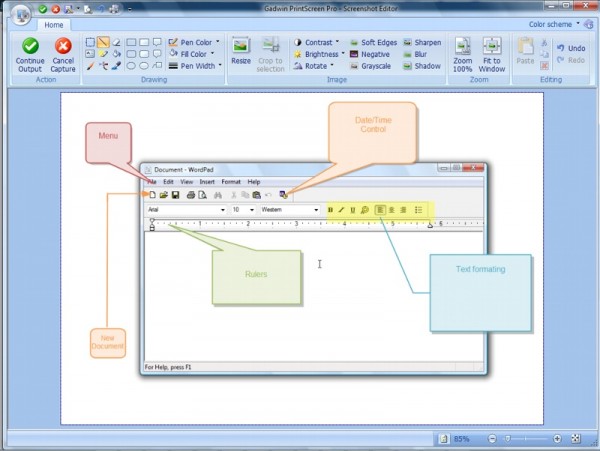Gadwin PrintScreen: just quick, easy and configurable screen captures

As screen capturing power goes, there’s no doubt that the standard Windows PrintScreen function is horribly basic. But some third-party capture tools head in the other direction, weighing you down with a host of overcomplicated options which you’ll probably never use at all.
If your needs are more straightforward, then, you might prefer something like Gadwin PrintScreen, which provides a good set of basic screengrab functions, yet always remains relatively lightweight and easy to use.
The program’s core features include everything you’d expect. It can grab the full screen, an individual application window or a rectangular area, for instance. This can be sent to the clipboard, a printer, despatched via email or saved to a file (BMP, JPG, PNG, GIF or TIF). And while by default it’s activated by pressing PrtSc, you can choose an alternative hotkey of your own.
Your capture can be processed in some useful ways, too. The program is able to resize it, for instance. You can have it converted to grey scale. A “Stamp” option allows you to add a custom text watermark to the grab (your name, the date and time, whatever it might be). And there’s even the ability to add a shadow to the image, although this isn’t implemented as well (it’s not offset so there’s no real 3D effect).
Perhaps most convenient, though, is that if you turn off previews (select Properties > Preferences, clear “Preview the captured image”) all of this can happen without any intervention at all. All you have to do is keep pressing PrtSc and the program might grab a window, resize that image, add a watermark, and save it using an automatically generated name while you just get on with whatever you need to do.
What you won’t find here are any custom annotation options. They’re reserved for the program’s commercial big brother, Gadwin PrintScreen Professional, which does include an excellent editor and can be yours for $24.95. (Take a look at HardCopy for a free alternative.)
Gadwin PrintScreen is easy to use, though, lightweight (it consumed under 4MB RAM on our test PC) and can run almost anywhere (it works on Windows 98 upwards), and if your screen capture needs are fairly standard then it could be a very good choice.
